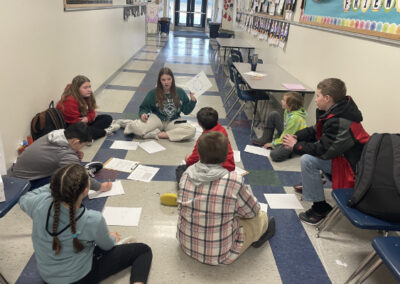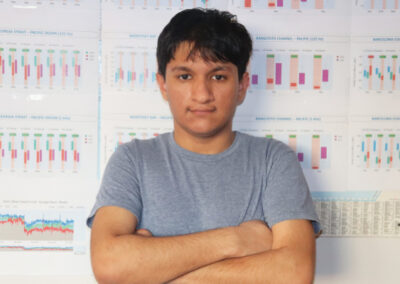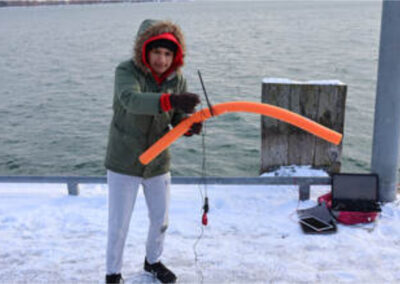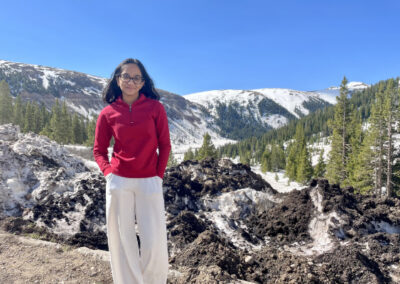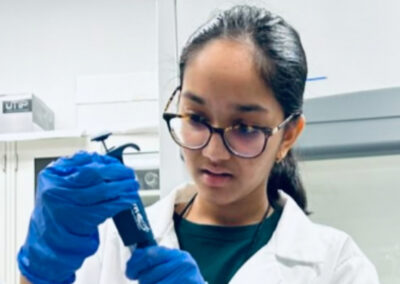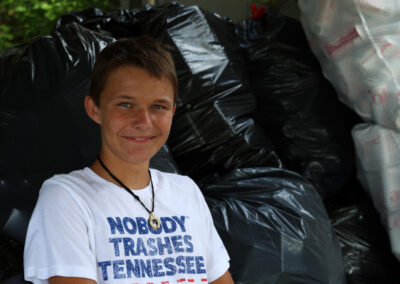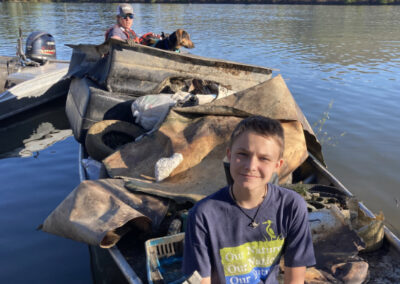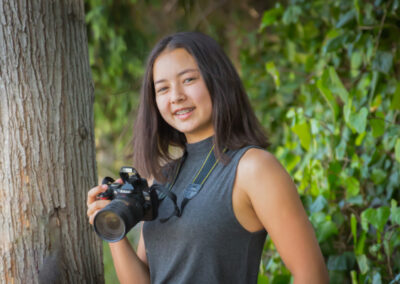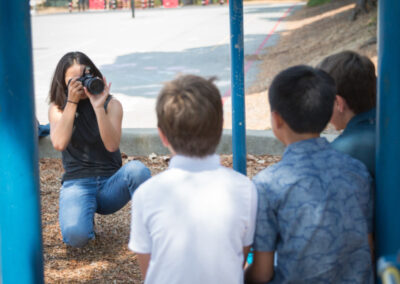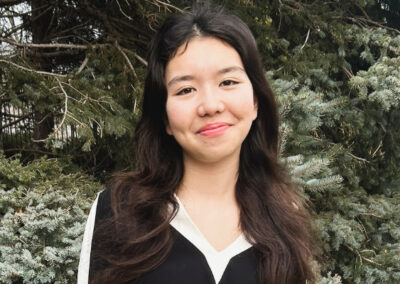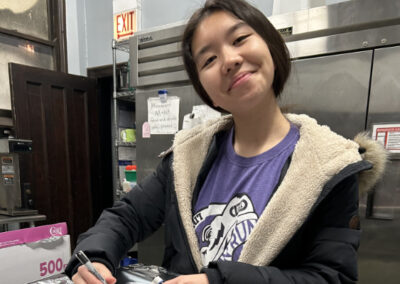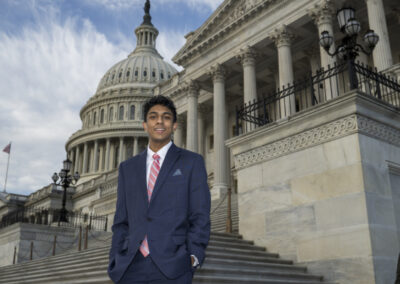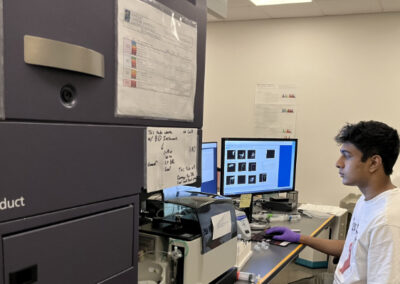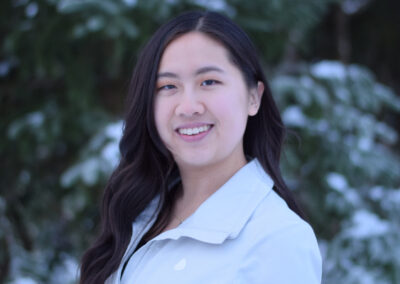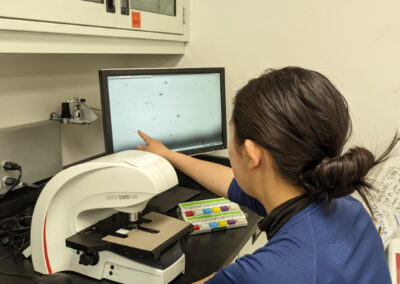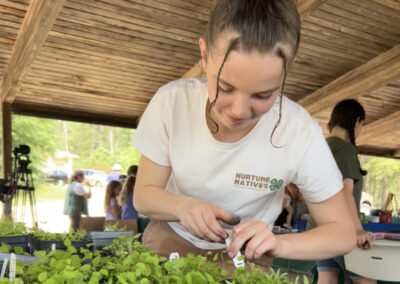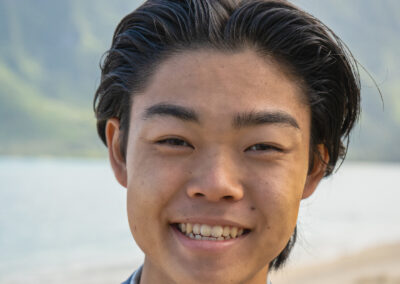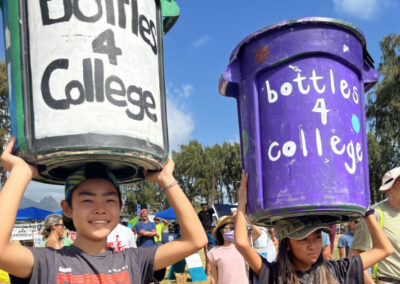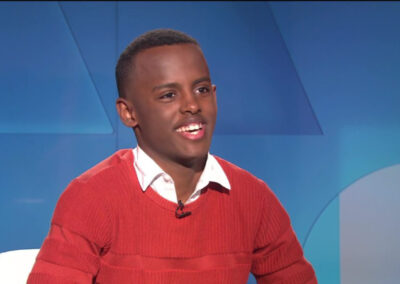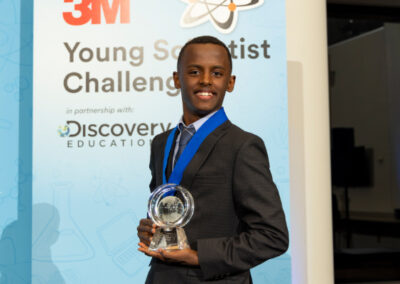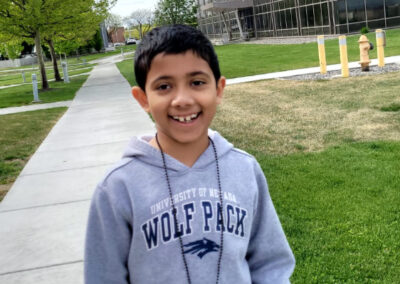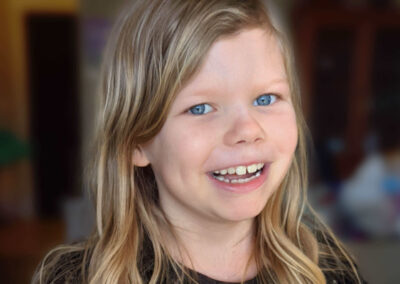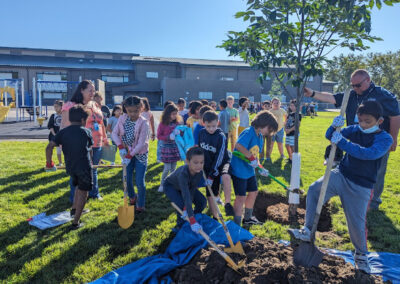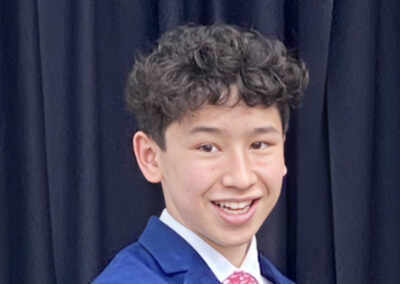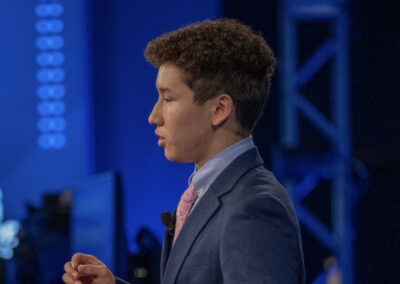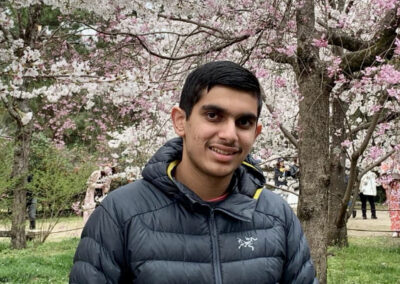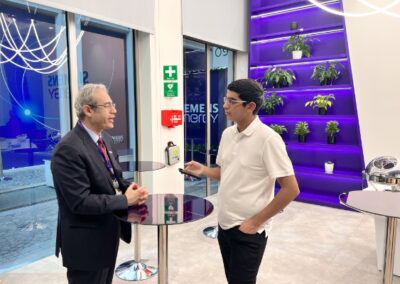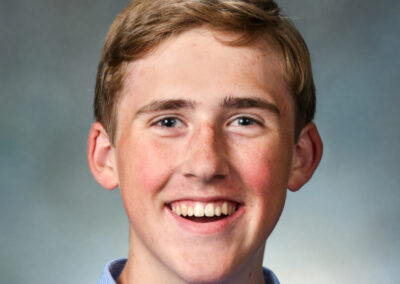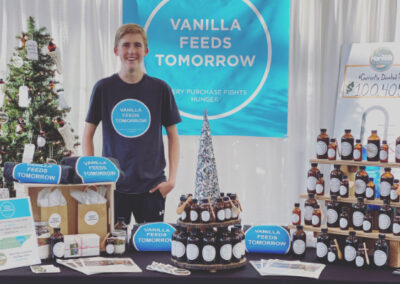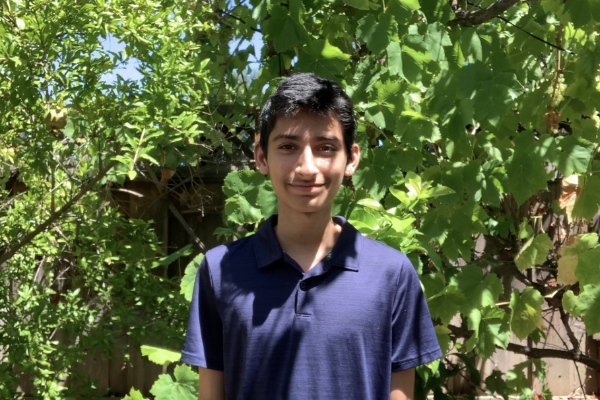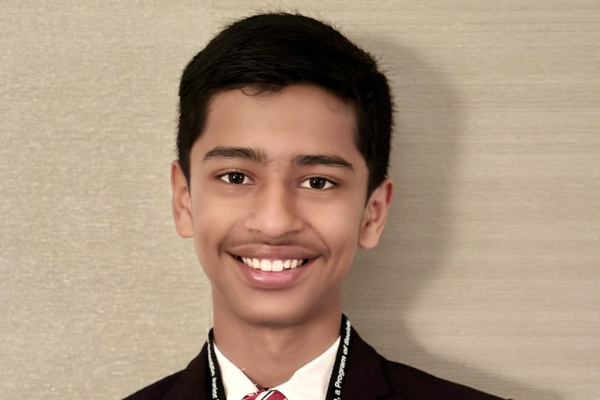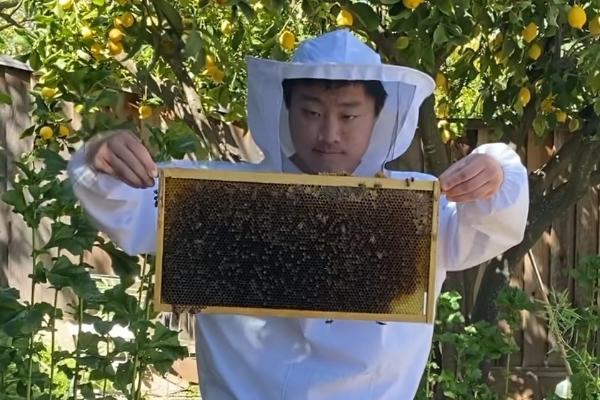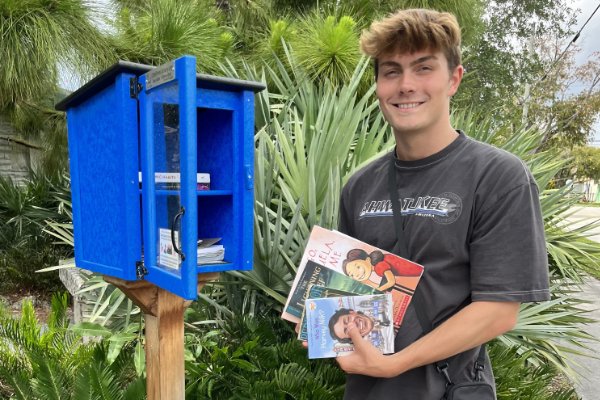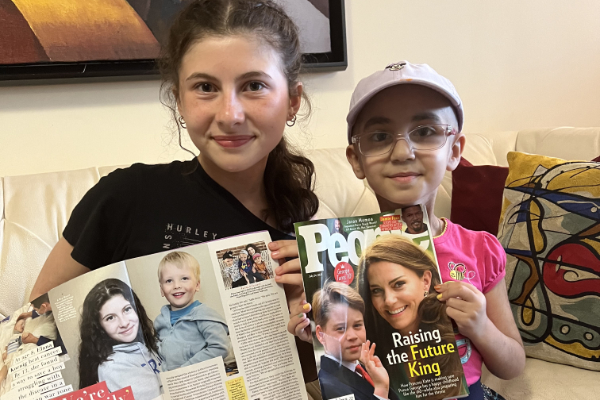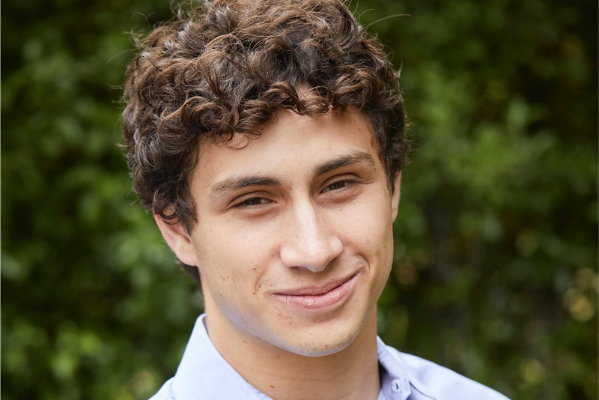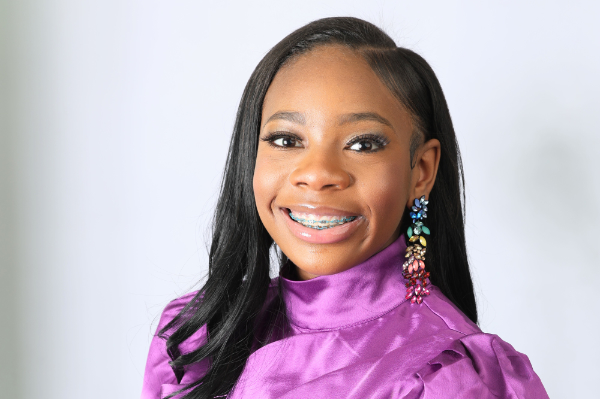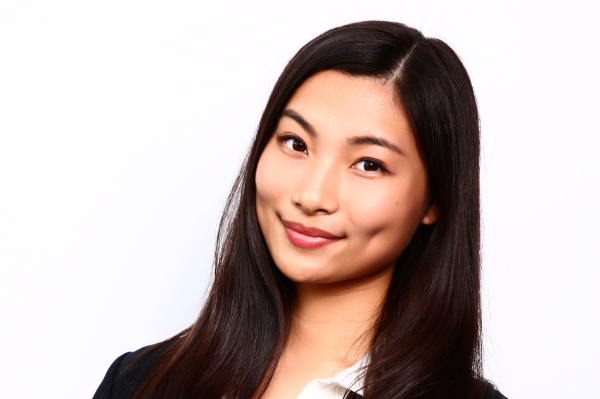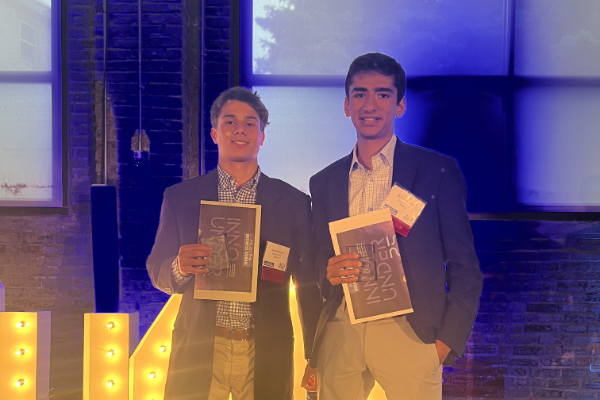Barron Prize Winners
2024 WINNERS
Articles featuring all of the 2024 winners:
PR Newswire – 09/17/2024
The Week Junior – 09/27/2024
Associated Press – 04/22/2025
Adeline Smith
Growing the STEM![]()
Adeline Smith co-founded Growing the STEM, a nonprofit that creates math and science programs for students in 14 underserved Idaho schools. In the 2023-2024 school year, her team recruited more than 100 teen volunteers to coach over 900 elementary and middle school students in 45 after-school programs. Clubs include Mathletes, STEAM Club, Engineering Club, STEM Book Club, Math is Cool, and Chess Club. Her organization has built strong community partnerships and receives program funding from the Idaho Community Foundation, United Way, and the Innovia Foundation, among other groups. Each year, her team also organizes a large-scale Trivia Night fundraiser. Proceeds support her nonprofit’s annual budget of more than $100,000, most of which is used to compensate school district teachers who oversee the teen coaches.
Adeline’s inspiration began in 2016, when she helped a fellow fourth-grader with math and realized the power of student-to-student support. The following year, she and her older sister started a math mentor program and created an after-school math team of students from a Title 1 school to help them prepare for a regional math competition. Eight years later, Growing the STEM continues to support underrepresented groups, including girls and low-income students, in pursuing STEM education and activities. “I’ve realized that even a small effort and passion can create an amazing snowball effect,” says Adeline. “And I’ve learned my life’s purpose is in the pursuit of improving things for others.”
Artash Nath
MonitorMyOcean.com![]()
Artash Nath created MonitorMyOcean.com to investigate human-caused ocean noise, which disrupts whales’ communication and navigation. Using real-time data from hydrophones (underwater microphones), his website’s app analyzes and displays changes in ocean noise across different oceans and times. Endorsed by the United Nations, the app serves as a visual tool for media, researchers, and policymakers interested in whale conservation. Artash launched his work in 2020 during the Covid lockdown, when he welcomed a quieter environment and an increase in bird song around his Toronto home. Curious if our oceans were also quieter and whales more vocal, he decided to collect baseline ocean noise information during the calm of lockdown. He learned of an open data hydrophone located near a shipping lane off the coast of California and managed by the Monterey Bay Aquarium Research Institute (MBARI). Artash accessed the data, spent months developing algorithms to analyze four years of recordings, and found that the ocean off California quietened nearly three-fold during lockdown due to decreased shipping and tourism.
A Senior Research Specialist at MBARI validated the 14-year-old’s findings and encouraged him to expand his data set. Artash reached out to 21 ocean researchers worldwide to gain access to 24 years of hydrophone recordings. After eight months of extensive data analysis, he developed MonitorMyOcean.com. He is now focusing on an extension of his project called You-OCEANS that uses AI to estimate whale diversity and population. He has developed a neural network trained on over 5,000 vocalization samples that achieves 98% accuracy in identifying specific whale calls. Artash has also created online training for other youth and citizen researchers interested in monitoring ocean noise. “I believe working for the public good is everyone’s responsibility, and I am confident that I will continue using my technology and data skills to make a difference,” says Artash.
Arya Gurumukhi
Improved upon the Bionic Leaf technology![]()
Age at Winning Prize
15
Home State
Texas
Additional Media Coverage
PEOPLE Magazine – 10/11/2024
Encyclopedia Britannica/BSchool News (National) – October 2024
Authority Magazine (National) – 10/26/2024
KDFW-TV/Fox 4 (Dallas) – 10/08/2024
Diversity in Action (National Magazine) – January – February 2025
Fearless Fabulous You (National Radio) – 02/19/2025
NPR Teen Scientist (National Radio) – March 2025
Plano Magazine (Texas) – 04/22/2025
Arya Gurumukhi invented a novel catalyst to improve upon the Bionic Leaf technology, a solar-powered device that mimics photosynthesis to create a highly efficient, alcohol-based fuel from just water, sunlight, and bacteria. She hopes her clean, sustainable energy source can reduce our dependence on fossil fuels and reduce energy insecurity for people in low-income and remote communities around the world. Arya’s work was inspired by the 2021 power outage in Texas during sub-zero temperatures, when she and her family huddled for a week in their unheated apartment. Changed by the experience and determined to develop a sustainable energy source, she dug into research about the pitfalls of our power grid and the promise of alternative energy. Months later, surrounded by green leaves in the park one day, she wondered, “What if we could create energy the way plants do, using just sun, water, and carbon dioxide?”
She began exploring her idea of an artificial photosynthetic system by reading online journals, emailing dozens of professors, and working late nights in a lab at the University of Texas. One year and one hundred iterations later, her prototype was finally able to cost-effectively produce three mg/L of raw fuel. Despite advice to sell or patent her research, she has instead published it as open-source work for others to use. She has begun partnering with local NGOs and companies to distribute her device to low-income and energy insecure communities. Already, more than 15 communities in South Sudan have started their own means of energy production through her Bionic Leaf. “I’ve learned that with strength and perseverance, I can accomplish anything,” says Arya. “And I’ve realized that we can create solutions that will help millions, but it requires courage.”
Cash Daniels
Protects freshwater ecosystems![]()
Age at Winning Prize
14
Home State
Tennessee
Additional Media Coverage
Local 3News – 09/19/2024
Chattanooga Times Free Press – 09/28/2024
Knoxville Daily Sun – 09/23/2024
Authority Magazine (National) – 10/26/2024
National Youth Leadership Council/The Power of Young People Podcast (National) – 11/27/2024
Cash Daniels is passionate about protecting freshwater ecosystems and has removed more than 35,000 pounds of trash from the Tennessee River, the world’s most microplastics-polluted river. He has partnered with Tennessee State Parks to place 150 fishing line collection bins across the state, protecting waterways and the animals who easily become entangled in the line. He has collected over 5,000 miles of used monofilament and recycled it to create fish habitat enhancements. Cash funds his collection bins with money earned by recycling aluminum cans – more than three tons of them to date. He began his work seven years ago by picking up trash while vacationing at the beach. Returning home, he realized he could continue to help the planet by tackling trash in his local river.
He began organizing clean-ups, working with numerous community organizations to rally volunteers, and was dubbed The Conservation Kid. Cash frequently presents to community groups and schools about the need to protect freshwater ecosystems. He has spoken to over 15,000 young people, reminding them that “Kids may be a small part of the population but we are 100% of the future!” Named one of five finalists for Time magazine’s Kid of the Year in 2022, Cash used the recognition to inspire other young conservationists. He co-founded a nonprofit called The Clean-Up Kids and wrote a children’s book titled One Small Piece. He is now hoping to expand his fishing line collection initiative to all fifty Tennessee state parks. The program has already spread to Georgia, Florida and Michigan, and Cash hopes to expand it to public lands across the country. “I’ve often heard others say they are waiting on someone to fix a problem,” says Cash. “I’ve realized that I am that someone and I refuse to sit back and complain. I’m taking action instead.”
Charlotte Rosario
Community Photobooth
Age at Winning Prize
17
Home State
California
Additional Media Coverage
PEOPLE Magazine – 10/11/2024
Encyclopedia Britannica/BSchool News (National) – October 2024
Bay Area Parent (California) – October 2024
Fearless Fabulous You (National Radio) – 02/19/2025
KSBW TV (California) – 02/11/2025
Diversity in Action (National magazine) – Section “20 Under 20” (pp. 30-36) – Summer 2025
Charlotte Rosario founded the Community Photobooth to use the power of youth and photography to address needs in her community and around the world. Her collective of young photographers has held more than 550 donation-based photoshoots to raise over $40,000 for global causes that are often overlooked. The group has photographed 3,500 individuals, using their cameras for good. Charlotte launched her initiative at age 12 after losing her father to suicide just days before the Covid lockdown. She found solace behind her family’s old Nikon camera, using it to capture nature and her friends during 6-foot-distanced photoshoots. Hoping to heal by helping others, she decided to use her newfound talent and love of photography to support others struggling with unseen hardships.
Charlotte’s Community Photobooth donations have supported sixteen global causes including a humanitarian health clinic in war-torn Sudan and protective gear for Ukrainian photographers documenting the war. Closer to home, she has donated to the Santa Cruz food bank to support families impacted by wildfires and to the Arctic Ice Project, a Bay Area nonprofit working to restore ice in the Arctic. Deeply committed to mental health, she donated $13,000 from her 2022 Photoshoot Fundraiser to relaunch a mental health program in local high schools. Charlotte and her photographers have also used their passion and skills to create a short documentary, It’s Time We Talk About It, to address the stigma around mental health. Their film has been broadcast to more than 1.7 million students, families, and educators and has garnered national media attention. “My journey with the Community Photobooth has taught me that invisible needs are ubiquitous,” says Charlotte. “I will never stop trying to make the world a better place and will forever focus—with my camera and heart—on the invisible.”
Clelia Poujade
Hands Together to Feed Chicago
Age at Winning Prize
17
Home State
Illinois
Additional Media Coverage
Encyclopedia Britannica/BSchool News (National) – October 2024
National Youth Leadership Council/The Power of Young People Podcast (National) – 11/13/2024
Beyondish (National) – November 2024
Fearless Fabulous You (National Radio) – 02/19/2025
Clelia Poujade founded Hands Together to Feed Chicago to use her lifelong passion for cooking to fight food insecurity and build community. She and her team of volunteers have prepared and served over 8,000 meals and desserts from scratch for those in need. She has built partnerships with nearly a dozen Chicago-area organizations and shelters, where she adapts her favorite recipes to feed 80 people. Clelia has compiled twenty of her most-loved recipes into a digital cookbook and has shared it with local shelters and volunteers, as well as organizations nationwide. A native of France, she grew up cooking in her grandmother’s kitchen, helping prepare meals for her extended family. When she moved to the U.S., she desperately missed cooking for others and the community it created.
In the summer of 2021, Clelia interned at a downtown Chicago hospital, studying food insecurity, and each evening noticed people lining up at shelters. She stopped in one night to help serve dinner and was reminded how much food can foster a sense of belonging. Soon after, Hands Together to Feed Chicago was born. Clelia now prepares monthly community dinners at Care for Friends, a nonprofit that offers meals, clothing, and basic medical care to those in need.
At another shelter, she initiated monthly birthday celebrations, complete with decorations and 100 of her homemade cupcakes. In February 2024, Clelia organized her inaugural Valentine’s Day Bake-a-Thon, collaborating with five local bakeries to deliver more than 1,400 sweet treats to shelters. “I’ve realized that I can do more than I thought I could,” says Clelia. “I’ve also learned that people are kind, and that everyone has a story worth telling and a heart worth helping.”
Ekansh Mittal
Develops personalized cancer treatments
Age at Winning Prize
17
Home State
Oregon
Additional Media Coverage
Portland Oregonian – 09/26/2024
Daily Tidings – 09/22/2024
Daily Kos (National) – 10/01/2024
Northwest Connection – 10/25/2024
PDX Parent (Oregon) – 10/24/2024
National Youth Leadership Council/The Power of Young People Podcast (National) – 11/13/2024
KATU-TV/CBS (Portland, OR) – 12/31/2024
Scout Life Magazine – April 2025
Diversity in Action (National magazine) – Section “20 Under 20” (pp. 30-36) – Summer 2025
Ekansh Mittal has worked for five years to improve outcomes for cancer patients through scientific research. He is especially passionate about personalized cancer treatments that precisely target cancer genes and account for patients’ individual differences. Using machine learning, he developed a way to identify genes responsible for resistance to cancer-fighting drugs and created a novel 3D model to validate the effectiveness of targeting these genes. Ekansh found that doing so was significantly more effective than traditional chemotherapy in killing cancer cells while preserving healthy cells. His methodology could improve individual patient treatment plans as well as the process by which drugs are selected for clinical trials.
Ekansh began his work at age 14 when his grandmother in India passed away just two months after her cancer diagnosis. Knowing that early detection could have helped her, he began researching detection methods outside of conventional MRIs and CT scans that would be accessible to rural populations. He developed a way to easily measure for a type of bacteria that is prevalent in some cancer patients, creating a simple but effective way to screen for certain cancers. Ekansh has published his research and presented it at the American Association for Cancer Research conferences. Committed to supporting other youth in studying STEM, he founded www.STEMUniverse.net and has provided online science and math workshops to 200 underserved students in five countries. “As a scientist, it is my responsibility to discover new solutions to the problems in the world,” says Ekansh. “It is also my responsibility to foster an interest in STEM for the next generation to develop future leaders.”
Elizabeth Djajalie
Protects Pacific salmon, supports STEM for youth![]()
Age at Winning Prize
18
Home State
Alaska
Additional Media Coverage
Juneau Empire – 09/20/2024
National Youth Leadership Council/The Power of Young People Podcast (National) – 11/27/2024
Fearless Fabulous You (National Radio) – 02/19/2025
Diversity in Action (National magazine) – Section “20 Under 20” (pp. 30-36) – Summer 2025
Elizabeth Djajalie works passionately to protect Alaska’s ecosystems and way of life by conducting research to help conserve Pacific salmon. She also leads the student arm of the Alaska Science and Engineering Fair (ASEF), a statewide nonprofit that supports STEM education for youth. Through her two initiatives, she is using science to protect the environment and is inspiring other students to do the same. Elizabeth first experimented with science in tenth grade when she tried using bull kelp from local beaches to create biodegradable cups in her kitchen. Though her experiment failed, it ignited a love of science. She began looking at her natural surroundings with curiosity and asking questions of local scientists and tribal leaders. They taught her first-hand about harmful algae blooms threatening seafood harvests and receding glaciers changing ocean chemistry.
Inspired to address local eco issues, Elizabeth decided to help protect salmon, ecologically critical and the lifeblood of many Alaskan communities. She began investigating how environmental DNA metabarcoding can be used to count and conserve Pacific salmon. Her research earned first place at the state science fair and a fourth place grand award at the International Science and Engineering Fair (ISEF). Thrilled to mingle at the fair with other young scientists, Elizabeth learned she was the only Alaskan student there due to limited funding. Determined to change that, she created the Student Spokespersons Board for ASEF and led her team in raising over $16,000 to send more students to ISEF the following year. Her team has also introduced science opportunities to 179 Alaskan schools, with a focus on supporting underrepresented students. “My ASEF Board members and I are still discovering how best to educate creatively and inspire broadly,” says Elizabeth. “But for communities all over Alaska, we are throwing every ounce of our ingenuity, energy, and passion into making a lasting impact.”
Esther Bonney
Nurture Natives![]()
Age at Winning Prize
17
Home State
Maryland
Additional Media Coverage
The Southern Maryland Chronicle – 09/23/2024
The Baynet – 09/24/2024
Prince George’s Post (Maryland) – October 2024
National Youth Leadership Council/The Power of Young People Podcast (National) – 11/13/2024
Esther Bonney founded Nurture Natives to protect native species and biodiversity while empowering youth. Her nonprofit educates adults and children about the increasing problems non-natives pose to agriculture, pollinators, and homeowners. To promote native plantings, her youth-led group hosts plant giveaways across Maryland where they have distributed more than 47,000 native seedlings and 550 sapling trees and shrubs. Nurture Natives has also planted 2.2 million seeds and distributed $24,000 worth of native plants to underprivileged communities. Collaborating with horticulture experts, Esther has published Nurture Natives: A Guide to Invasive Species and their Native Look-Alikes. She has distributed hundreds of her guides to nurseries across seven east coast states.
Esther’s program grew out of personal tragedy when as a 13-year-old, she lost her older brother to suicide. She sought solace and refuge in nature, filling her days with walks along the creek near her home. She learned to identify native plants and pollinators, rediscovering herself in the process. She became a 4-H Pollinator Ambassador, leading presentations at schools and libraries.
After attending the National 4-H Summit on Agriscience, she returned home eager to address a local agricultural problem. Through discussions with local farmers and scientists, she identified a critical concern: the proliferation of invasive plant species threatening local crops and native ecosystems. Nurture Natives is her way to help through education and native plant giveaways. Esther’s team has also helped pass state legislation banning Callery pear trees, a fast-growing non-native used in landscaping, and is working on new legislation that will enforce the integration of native plants into public landscaping. “My experiences have reinforced my belief that a flourishing environment is inseparable from the health of the communities it sustains,” says Esther. “I am committed to advocating for a future in which both our youth and environment thrive.”
Genshu Price
Bottles4College![]()
Age at Winning Prize
16
Home State
Hawaii
Additional Media Coverage
Khon TV – Sep 2024
Yahoo News – 09/19/2024
Encyclopedia Britannica/BSchool News (National) – October 2024
National Youth Leadership Council/The Power of Young People Podcast (National) – 11/13/2024
Hawaiʻi Public Radio/KHPR – 04/10/2025
Genshu Price created Bottles4College, a nonprofit that helps protect the environment by recycling cans and bottles and uses the proceeds to provide college scholarships for Hawaii students. Over the past three years, his group has recycled more than 1.7 million cans and bottles, diverting 140,000 pounds of trash from landfills. In 2023, Genshu awarded Hawaii high school seniors Bottles4College’s first ever scholarships – nearly $22,000, raised five cents at a time. He did the same in 2024, bringing his scholarship total to $43,500. He has also granted $10,000 in disaster relief funding to those affected by the 2023 Maui wildfires. Genshu personally recycles 15,000 cans and bottles each week, while also running his nonprofit. He maintains collection bins at schools, residences, and businesses throughout Oahu, and schedules large-scale recycling drives at community spaces. Bottles4College also brings sustainability through recycling to Hawaii’s events including surfing championships that draw audiences of more than 20,000. Genshu organizes the myriad logistics for these events and is helped by his cadre of volunteers, many of them students.
Genshu is passionate about protecting his state’s beautiful islands, where more than 900 million cans and bottles are sold each year. Many of them end up along roadways, on beaches, and in the water. Genshu has built partnerships with more than thirty businesses and organizations including United Airlines and Sustainable Coastlines Hawaii. He is also building a large Instagram following to garner support for his work. He hopes his recycling inspires more people to protect the environment and that his scholarships motivate more students to consider the possibility of college, despite Hawaii’s high cost of living. “Bottles4College’s impacts are made through the community’s aloha and unity to help better Hawaii’s environment, education, community, and lifestyle,” says Genshu. “I attest that when you put 1000% effort into your beliefs, a community will come together to help you make a true impact.”
Heman Bekele
Invented affordable soap that treats skin cancer
Age at Winning Prize
15
Home State
Virginia
Additional Media Coverage
Northern Virginia Magazine – 09/19/2024
Encyclopedia Britannica/BSchool News (National) – October 2024
Washington Family Magazine (DC) – (See pp 6-7) – December 2024
The Week Junior U.S. (National magazine) – “People of the Year”
Heman Bekele has developed a bar of soap that helps treat skin cancer by delivering a cancer-fighting drug that slowly repairs damaged cells. His soap uses lipid-based nanoparticles to keep the cancer-fighting solution on skin even after the soap is washed off. A bar of his soap costs less than $9.00, providing an affordable alternative to traditional and expensive skin cancer treatments. For his work, Heman was named America’s Top Young Scientist by 3M and Discovery Education in October 2023. The platform allows him to advocate for affordable skin cancer treatment and to connect with other scientists. The recognition also came with a $25,000 research grant to continue developing his idea. He is pursuing FDA certification for his soap by conducting clinical trials on mice.
Heman’s inspiration began in Ethiopia, where he was born and raised. He remembers people working long hours in hot fields, unaware of the sun’s damage to their skin. He also remembers the lack of affordable healthcare. As an 11-year-old eager to use his love of science to make a difference, Heman resolved to find an effective and inexpensive skin cancer treatment. He dug into intense research, development, and testing and two years later, had built a functional prototype and tested it on mice. He plans to continue his research through college and by 2028, create a nonprofit to distribute his soap to underserved communities worldwide. He is also continuing to advocate for affordable healthcare, including lower prices on essential medical treatments. “This experience has taught me that the possibilities for change are limitless,” says Heman. “I am just a 14-year-old boy and yet I now know that my voice can be heard and that with hard work, passion, and perseverance, I can make a difference in the world.”
Nirbhuy Arun and Alexis Nicholson
Kids for Urban Trees![]()
Age at Winning Prize
9 and 10
Home State
Washington
Additional Media Coverage
Encyclopedia Britannica/BSchool News (National) – October 2024
Northwest Public Broadcasting (Washington state) – 10/02/2024
Scout Life Magazine – April 2025
KNDU/NBC TV – 04/22/2025
Ranger Rick – August 2025
Nirbhuy Arun and Alexis Nicholson, co-founders of Kids for Urban Trees, have helped plant more than 300 trees at schools, parks, and low-income housing complexes in Eastern Washington. The two friends started their club to address the urban heat island effect and to help develop other young environmental stewards. They focus their efforts on planting trees in low-income neighborhoods, pre-planting trees to replace aging ones, and increasing their community’s urban tree canopy. They are currently working with the Benton Franklin Health District to plant shade trees around school playground equipment to reduce the chances of summertime burns and heat stroke. They also run outreach events at libraries and museums to educate adults and youth about the benefits of trees. In the past three years, they have reached over 700 children.
Kids for Urban Trees serves as the youth branch of the Mid-Columbia Community Forestry Council, a local nonprofit that Nirbhuy and Alexis approached with their idea for a youth initiative. With the nonprofit’s support, the two friends began their work by conducting a study to measure the urban heat island effect in their community, bringing together volunteers to help them over the course of a summer. When results indicated the need for more trees to help cool their city, Nirbhuy and Alexis set to work designing flyers, T-shirts, and banners. They also wrote grants and presented to their local Rotary Clubs and the 3 Rivers Community Foundation to receive funding. The two have used the funds to purchase trees and saplings along with kid-sized shovels and gloves, allowing kids participating in plantings to feel empowered and valued. “I’ve learned that deep-rooted passion can enable me to achieve goals for a purposeful cause,” says Nirbhuy. “I’ve learned that my community cares about the environment like I do, and they just needed a group like ours to rally around,” adds Alexis.
Sebastian Tan
OutsideConnection
Age at Winning Prize
16
Home State
Pennsylvania
Additional Media Coverage
Encyclopedia Britannica/BSchool News (National) – October 2024
Pittsburgh Post Gazette – 10/03/2024
Sebastian Tan founded OutsideConnection to help previously imprisoned individuals find jobs and rebuild their lives after incarceration. His online hiring platform currently lists openings in 34 cities across 17 states and has provided job access to more than 10,000 reentrants. The platform uses AI to scour the Internet for job openings at companies committed to hiring previously incarcerated individuals. The system then filters the data to match reentrants with jobs that fit their skills and aspirations. Listings include openings at Amazon, Home Depot, and Chipotle. Sebastian has worked to target listings in cities especially impacted by incarceration including Detroit, Philadelphia, and Pittsburgh. OutsideConnection is used by prison systems, reform initiatives, and the U.S. Department of Justice, which has adopted the program into its reentry curriculum.
Sebastian knows the statistics that support his work — how employment vastly decreases the odds of recidivism (reentrants committing another offense), from 52% to 16%. He also knows firsthand that hiring reentrants can be life-changing, both for employees and employers. Since age 7, he has worked alongside reentrants in his aunt’s bakery, for many years one of the few businesses in Pittsburgh willing to hire people who were previously incarcerated. More than just employees, the reentrants have become like family, mentoring Sebastian and shuttling him to after-school activities when needed. Sebastian has learned their stories of hardship, including generational poverty and broken families. He has also seen the power of steady employment and the hope it provides. “One of the most profound lessons I’ve learned is the power of empathy and understanding,” says Sebastian. “I’ve come to see reentrants as individuals with dreams, aspirations, and the potential to contribute positively to society.”
Varin Sikka
AirCat![]()
Age at Winning Prize
16
Home State
California
Additional Media Coverage
Bay Area Parent (California) – October 2024
National Youth Leadership Council/The Power of Young People Podcast (National) – 11/27/2024
Earth911 (National Podcast) – 02/03/2024
Varin Sikka invented AirCat, a Direct Air Capture (DAC) system that removes carbon dioxide from the air on a large scale and holds the potential to significantly mitigate climate change. He has 3D printed a residential-scale prototype of AirCat and is working with industrial partners to build an industrial-scale version of it. Varin’s system makes use of the world’s 300,000+ wind turbines that provide renewable energy. AirCat is powered by the excess energy that turbines produce, with up to half of each turbine’s energy otherwise wasted. Essentially powering itself, the system allows for net zero energy usage – a significant advantage over most DAC systems that consume massive amounts of energy. Varin has worked for three years to develop AirCat, spending countless hours teaching himself advanced math and science. Mentors in his community and at internships have helped him navigate a myriad of conceptual and technical challenges.
Varin’s work began in the summer of 2020, when wildfires burning near his California home turned the sky an eerie orange for weeks. The experience drove home the reality of climate change and inspired Varin to do something about it. Knowing that current DAC systems are criticized for consuming so much energy, he decided to develop a more efficient design. Three years later, he brought AirCat to the United Nations’ COP28 conference in Dubai, where climate experts embraced his DAC design. Varin is currently working with Siemens Energy to explore deploying his system in partnership with a large energy company. He dreams of AirCats in use around the world, especially in developing countries with little access to technologies that mitigate climate change. “I’ve learned that bringing change to an existing process or system requires time and patience,” says Varin. “I’ve also learned that pursuing something one is passionate about makes for an incredibly fulfilling journey.”
William Cabaniss
Vanilla Feeds Tomorrow
Age at Winning Prize
18
Home State
Tennessee
Additional Media Coverage
Knoxville Daily Sun – 09/23/2024
WATE TV (Tennessee) – 10/23/2024
Knoxville News (Tennessee) – 11/27/2024
William Cabaniss makes and sells pure vanilla extract through his nonprofit, Vanilla Feeds Tomorrow, and donates all profits to his community’s regional food bank. In four years, he has donated more than $210,000 to help feed over 631,000 East Tennessee residents in 18 counties. He has built a network of 100 volunteers, many of them his peers, who help him label, package, and ship orders. Growing up in rural Tennessee, William has seen many of his classmates and friends struggle with food insecurity – eating breakfasts and lunches provided by school and taking home backpacks of food on weekends. When Covid hit, he saw newscasts of long lines at food banks and knew the problem was only getting worse, especially for children unable to eat at school. At the same time, he was using the quiet days of lockdown to rediscover his love of baking.
One night as he measured vanilla for his signature brownies, he wondered if he could make vanilla himself and sell it to support the food bank. He launched into research about sourcing vanilla beans and making them into extract. He also taught himself about product design and tax laws. As he began making and selling vanilla, word spread quickly. People magazine and NBC Nightly News shared his story. The Obamas and Dolly Parton sent words of encouragement. Orders poured in and William’s assembly line of volunteers wrapped around his kitchen and into the dining room. He has now sent vanilla to customers in all 50 states and has helped feed more than half a million people. “I have experienced the power of small actions and mobilized my community to make a difference,” says William. “I have learned about the potential of altruistic action and the inherent kindness inside everyone.”
FINALISTS
Formerly called Honorees
Aaryan Doshi
CirFin![]()
Age 17, California
Aaryan Doshi created CirFin to educate young people about moving from our take-make-waste linear economy to a more sustainable circular one that promotes the reuse of products. His nonprofit teaches students how financial technology (fintech) like blockchain can support a circular economy that promotes the reuse, rent, repair, and return of products instead of their disposal. He has written a book, Designing on the Brink: Products for a Climate in Crisis, to explain how corporations can be incentivized to redesign everyday products like athletic shoes and phone chargers to extend their life cycle. Since starting CirFin in 2021, Aaryan has taught hundreds of students through in-person and online workshops about using fintech and sustainable practices to effect change. He has also created CirFin AI Assistant, an online tool that answers questions about the concepts he teaches. With the CirFin platform, he has been able to reach more than 5,200 students globally and has launched a podcast series called Earth Day Everyday. “Through CirFin, I’m working to spark many small changes – one student, one book chapter, one podcast episode at a time,” says Aaryan. “Step by step, CirFin strives to make a transformational impact to save our planet.”
Adyant Bhavsar
Developed a reliable alternative energy source![]()
Age 13, California
Adyant Bhavsar is committed to advancing sustainable STEM solutions to address pressing real-world challenges. He has developed a reliable and cost-effective alternative energy source that converts mechanical energy into electricity, specifically designed to power low-voltage devices. This self-sufficient power source holds potential for critical applications, including wildfire detection and prevention, as well as powering essential devices such as pacemakers and hearing aids. Inspired by the wildfires near his California home and the lack of a continuous, reliable energy source for remote wildfire detection cameras, Adyant embarked on a quest for a solution. His extensive research led him to Triboelectric Nanogenerators (TENGs), which generate an electric charge through the contact of two objects. After a year of experimentation, Adyant developed a lightweight, reusable TENG structure capable of powering an LED in his prototype. His breakthrough earned him the prestigious Lemelson Award for Invention at the 2023 Thermo-Fisher Junior Innovators Challenge. Adyant is using his award money to further develop and test his TENGs and is collaborating with local firefighters to identify optimal locations for deployment. “I’ve learned that the power to change the world begins with a single move toward innovation and a commitment to making a difference,” says Adyant. “At any age, having the courage to dream big is essential for making a lasting impact.”
Andrew Liang
Beewell![]()
Age 16, California
Media Coverage
Bay Area Parent (California) – October 2024
Bee Culture Magazine – 04/23/2025
Andrew Liang created Beewell, an AI-driven system that improves bee colony health monitoring for beekeepers. His system runs bees’ appearances and sounds through neural networks to provide real-time livestreams of beehives and accurate assessments of hive health. Fascinated by animals and nature since childhood, Andrew was alarmed to learn of the 40% decline in beehives over the past decade. Determined to help protect hives, he began asking beekeepers near his home and around the world for data on their bees and became a beekeeper himself. When he noticed a strong correlation between the appearance of bees, the sounds they made, and their hive’s health, he began working to integrate visual and audio signals into a monitoring system. Twenty prototypes later, he developed a novel neural network to merge the signals and differentiate between various states of hive health. He has published a peer-reviewed paper on his work, educates students at local schools, and organizes honey sales to support local beekeepers. He is also working with Campbell city officials to change laws that severely restrict residents from beekeeping within city limits. “Throughout this journey, I’ve learned that my scientific efforts are much more meaningful when I am working to benefit society,” says Andrew.
Chase Hartman
Eco Brothers![]()
Age 18, Florida
Chase Hartman co-founded Eco Brothers, a nonprofit that promotes literacy, education equity, and conservation. Over the past eight years, he and his brother have redirected hundreds of thousands of gently used books from landfills to students in need. They have also raised more than $165,000 to buy thousands of new books, including dual-language titles and ones that feature minority characters. Their efforts have supported underserved youth in all 50 states, including 65,000 Title 1 elementary students in the Tampa area. The brothers have built a volunteer base of more than 200 youth who support their book collections and distributions, along with beach clean-ups and food drives. Chase began his efforts as a fifth grader when he held his first book drive at a school dance. Today, he is navigating Florida’s recent banned book laws and has spoken out against them at school board meetings. He is also expanding his project’s reach by
establishing a Youth Board and Council that will create service initiatives in line with Eco Brothers’ mission. Already, he is supporting over 75 members in 19 states and nine countries.
“I’ve become a more open-minded, empathetic, and confident leader who isn’t afraid to enter unknown environments and use my voice and drive to create positive change,” says Chase.
Elana Koenig
Koenig Childhood Cancer Foundation (KCCF)
Age 16, New York
Elana Koenig founded Koenig Childhood Cancer Foundation (KCCF) and has raised more than $1.5 million to help over 3,500 children and their families battling cancer. Since 2020, she and her team have made more than 2,500 hospital visits and delivered over 40,000 care packages and gift bags. Her inspiration stems from her own battle with childhood cancer. Diagnosed at age 7, she spent 15 months in the hospital, enduring 15 surgeries and nine rounds of chemotherapy. At age 11, she founded KCCF using $900 in her piggy bank. Since then, she has fundraised to support children across the U.S. and around the world in receiving cancer treatment their families could not otherwise afford. She has brought children from Ukraine and Turkey to New York City for treatment at Memorial Sloan Kettering Cancer Center. Elana dreams of establishing a KCCF house near the hospital where children can stay with their families while undergoing treatment. “This work has helped me discover my own strength and resilience in the face of adversity,” says Elana. “And it has dramatically shifted my perspective of the world as I’ve seen firsthand the incredible generosity and compassion of people.”
Henry Lien
ChessPals
Age 18, California
Photo: Diller Teen Tikkun Olam Awards
Media Coverage
Bay Area Parent (California) – October 2024
Marin Living Magazine (California) – November 2024
Henry Lien founded ChessPals to provide free chess lessons to underserved youth. His nonprofit trains teen players to teach chess at elementary schools, after-school programs, and summer camps. Since 2018, he and his team have taught more than 1,000 students, many of them first-generation immigrants. An avid chess player since age six, Henry grew up in his county’s thriving competitive chess scene. He realized early on that the high costs of coaching and competitions prevent many kids from enjoying chess and reaping its benefits. At age 12, he decided to do something about it. He started by teaching free lessons at one elementary school and then recruited his chess friends to teach at other schools. When Covid hit, classes shifted to Zoom and Henry used the extra time to develop curriculum and expand his outreach. As the pandemic ended, ChessPals was invited to teach at district-wide summer camps and the program quickly spread across California. It now operates multiple youth-led chapters nationwide and Henry hopes to expand to all fifty states. “ChessPals has helped me understand the importance of committing to a desire to help,” says Henry. “I now fully recognize the power we all have to make a difference.”
Legacy Jackson
Little Legacies Community Service
Age 15, Missouri
Photo: Andre Wiley
Media Coverage
PEOPLE Magazine – 10/11/2024
KSDK TV (St. Louis) – 11/17/2024
Legacy Jackson founded Little Legacies Community Service at age 7 to provide opportunities for young people to serve their communities. In the past seven years, she has led more than 200 youth volunteers in completing over 100 projects to help people in Saint Louis and beyond. She and her peers have organized book and clothing drives, created care packages for kids with cancer, and made lunches for the homeless. They have also sent more than 3,000 pairs of shoes to Africa, created a library of 2,000 books for a children’s home, and gifted luggage sets to 50 kids entering foster care. Legacy recently earned her Girl Scout Gold Award for creating an interactive play space for children at Gateway 180, Missouri’s largest emergency family shelter. With help from more than 50 volunteers, she transformed a large empty room into a space where children can build, dress-up, read, make crafts, and play games. She has shared her blueprint with at least one family shelter in each of the 50 states. “I’m not old enough to drive a car but I know I’m doing my part to make the world a better place,” says Legacy. “If everyone does something, we can change the world!”
Mari Copeny
Provides free water filters to combat environmental racism![]()
Age 17, Michigan
Mari Copeny has raised $1,000,000 to provide water filters to people living with elevated levels of lead in their tap water, many of them residents of low-income and minority neighborhoods. She also uses her voice and widely followed social media to speak up about environmental racism. She became known as Little Miss Flint at age 8 when her letter to President Obama helped bring him to Flint, Michigan in 2016 at the height of the city’s water crisis. While the federal government worked to fix the problem, Mari raised more than $350,000 to buy one million bottles of water for Flint residents. Age 12 at the time, she began looking for a more sustainable, eco-friendly solution and connected with a Ph.D. chemist who had developed a low-cost, easy-to-install water filter. Partnering with him, Mari crowdfunds to send water filters free of charge to people in hundreds of U.S. cities. She has also crowdfunded to raise $700,000 for Flint Kids, her initiative to support underserved children with back-to-school backpacks, holiday gifts, and books by authors of color. “I never really planned to become an activist but once I learned there was a problem, I wanted to help solve it,” says Mari. “And that’s exactly what I have done.”
Mia Lee
LingoX
Age 18, California
Mia Lee founded LingoX, a nonprofit that provides free language classes for refugees, indigenous communities, and low-income students in 136 countries across six continents. Her program has provided more than 101,000 hours of learning valued at nearly $1.1 million. LingoX grew out of Mia’s awareness that language education, often lacking in underserved communities, is critical for employment and financial stability. She started out small, arranging for students in the U.S. to tutor students overseas in English, and vice versa. When demand outpaced capacity, she worked to create English Classroom, LingoX’s flagship program, which she offers free of charge to schools, nonprofits, and humanitarian agencies worldwide. She and her team spent months developing more than 150 lessons to teach English with accompanying audio recordings, activities, and exams. The lessons can be taught virtually or in person. Mia also created Shoujen Scholars, an 11-week introductory Chinese course that serves thousands of low-income students across the world. She is expanding LingoX and now oversees chapters in the U.K., China, and New Zealand, among other countries. “LingoX has given me purpose,” says Mia. “Though many of our students face challenging circumstances, including war and poverty, they share a fervent desire to change both themselves and the world for the better.”
Rohan Kapoor and Jack Reichert
Go Green filter![]()
Age 18, Pennsylvania
Media Coverage
Delaware County Times (Pennsylvania) – 11/10/2024
Chester County Press (Pennsylvania) – 11/20/2024
Rohan Kapoor and Jack Reichert developed the Go Green filter, a novel solution to reduce vehicles’ carbon emissions through a filter clamped inside the exhaust pipe. Their system uses microalgae to turn emissions into oxygen instead of harmful carbon dioxide. The filter costs just $50 and in repeated testing, reduces emissions by more than 74 %. The boys estimate that if all cars utilized their system, it would reduce the world’s carbon emissions by over 16%. Inspired by the work of an MIT professor, Rohan and Jack acquired algae from a local botanist and 3D printed a filter to fit an exhaust pipe. They worked for nearly a year through multiple challenges to refine their design. Numerous car manufacturers have approved their most recent iteration and the boys have begun distributing their filters in developing countries. They are also in discussions with the EPA. The two hope that in the future, manufacturers will be required to include their filter in every car made. “We’ve learned that when people see passion and a relentless attitude, they’re willing to help others through unforeseen obstacles,” say Rohan and Jack. “Through it all, you only survive by being able to adapt and by having a strong conviction that what you’re producing will work.”


